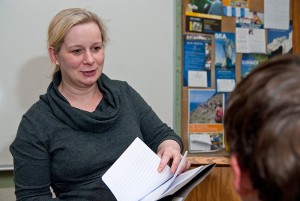
What should students do when they have earned their degree? For Martina Lüke, who was named ‘Outstanding Teaching Assistant for 2009-2010,’ the answer is simple: they should earn another one.
That’s exactly what she’s doing, anyway.
A native of Germany, Lüke studied history, German, and education as an undergraduate, and earned her Ph.D. in education from the University of Hamburg. She then decided that it was time to embark on a career in teaching.
“I come from a family of teachers, and I love to explain things, so teaching was a natural career choice for me,” says Lüke. “But I was working towards a tenure track position as a teacher, and I knew that if I was accepted for it, I would be there forever.
“So I thought – now or never. I was in my late 20s, I knew that there was still so much out there for me to learn, and it was simply that: now or never.”
Determined to study abroad, Lüke came to UConn to pursue what she thought would be a “quick” master’s degree in German literature. The arrangement offered the best of both worlds for, as Lüke explains, it allowed her to learn and teach at the same time.
“But as my degree was coming to a close,” she says, “my advisor approached me about staying. They liked my teaching, they liked my writing; in the end, they tried to convince me to switch from an MA to a Ph.D.”
Lüke decided to stay and complete her doctorate under Professors Katharina von Hammerstein and Anke Finger, both faculty members in German studies and comparative literature in the department of classical and modern languages. She says their constant support and encouragement were important factors in helping her decide to stay.
Von Hammerstein says, “[Martina has] proven that she has what it takes to make a difference in the field of German literacy and cultural scholarship.”
A versatile and productive scholar, Lüke has published numerous articles and presented material at both national and international conferences, all while working on her second dissertation and acting as a cultural ambassador between the United States and Germany.
Lüke says people find it strange that she is pursuing a second doctorate: “But I look at it like this: the more you learn, and the more you exchange ideas, the better. So much pain in the world comes from not knowing things – not knowing other cultures, not knowing other people, not knowing other ideas. When you really look at it, you see that evil sprouts at its root from ignorance.”
Lüke credits her love of knowledge and learning to the great German philosopher Immanuel Kant, whom she read in high school. It was Kant’s belief that man could only come to understand the most important of philosophic questions by first understanding the sources and limits of human knowledge; that one must strive to understand as much of the world around them, in order to understand oneself.
“When I first read Kant, his ideas literally blew my mind,” says Lüke. “His motto ‘dare to know’ is essential to me as a human being, student, and instructor. It holds the key to each person’s intellectual liberation.”
Lüke is currently studying representations of violence and warfare in German Romanticism and will complete her Ph.D. in May. Upon graduation, she plans to go back into teaching, at either the high school or college level.
“If I’ve taught my students one thing,” she says, reflecting on her time as a TA, “I hope it is that they should love and enjoy the opportunities they have to learn. I hope that they will be open-minded and willing to try new things, I hope that they will look at the world from different perspectives, and – above all – I hope that they will dare to ask questions.”


